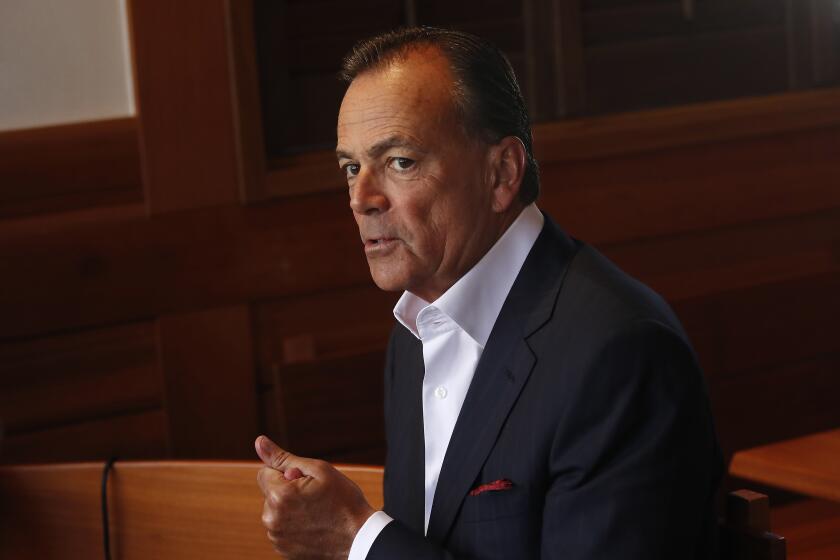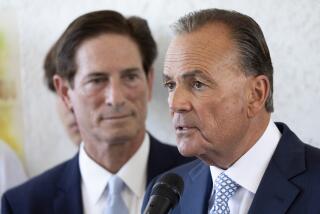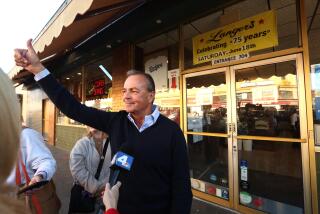Rick Caruso has entered the mayor’s race. Will L.A. elect a billionaire?
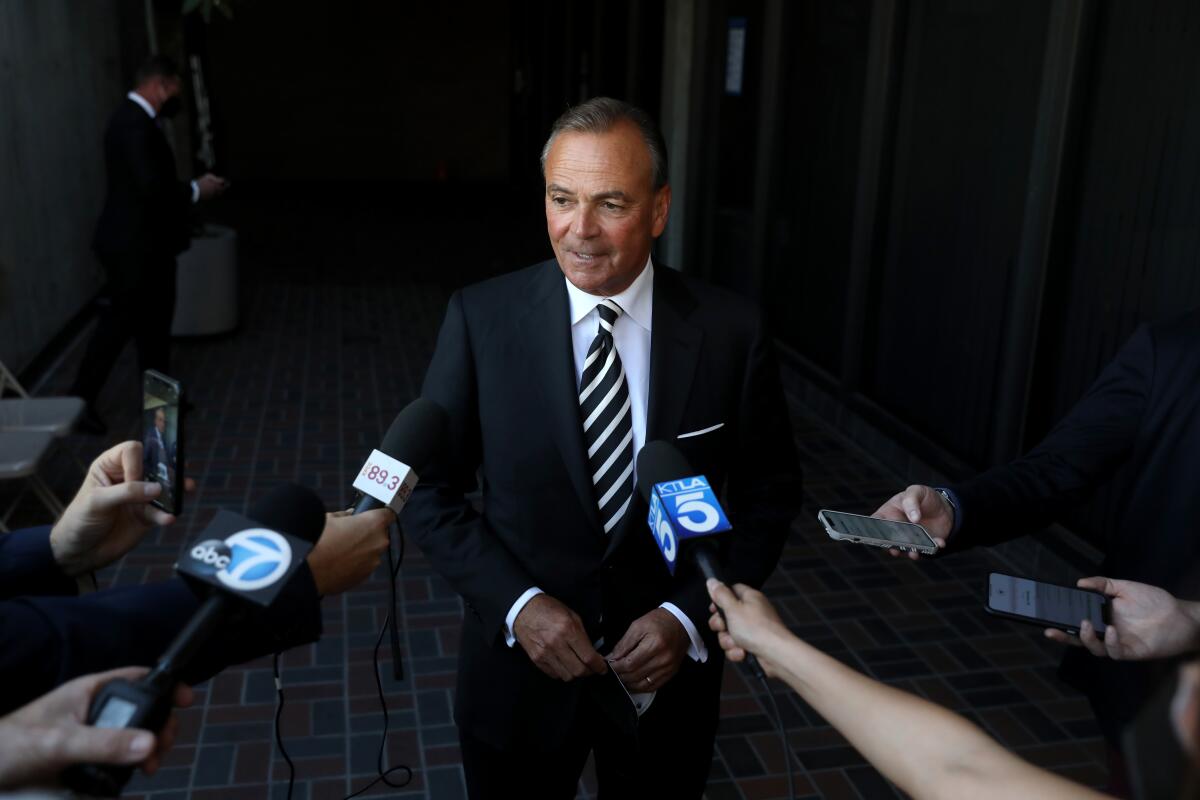
- Share via
Rick Caruso, the billionaire developer of the Grove and other luxury properties, has officially jumped into the contest to become Los Angeles’ next mayor, shaking up a race that to this point has been led by Democratic elected officials.
Caruso, 63, filed papers with the city clerk Friday, ahead of the Saturday deadline, declaring his intention to run in the June 7 primary.
“I’m excited to be here. It’s a very meaningful day for me and my family,” Caruso said afterward. “I love Los Angeles.”
Caruso’s short statement to the media was interrupted by a single protester who screamed, “L.A. doesn’t want a billionaire as mayor.”
Caruso, who last month switched his party affiliation to Democrat, has never held elected office, though he has been active in the bureaucratic machinery of the city since his appointment in the mid-1980s to the Department of Water and Power board. He also has served as president of the L.A. Police Commission and chair of the USC Board of Trustees.
Caruso has said he believes that elected politicians have failed voters on crises such as homelessness. He has also pointed to the rise of crime in some areas in recent years as an issue on which he would focus if elected.
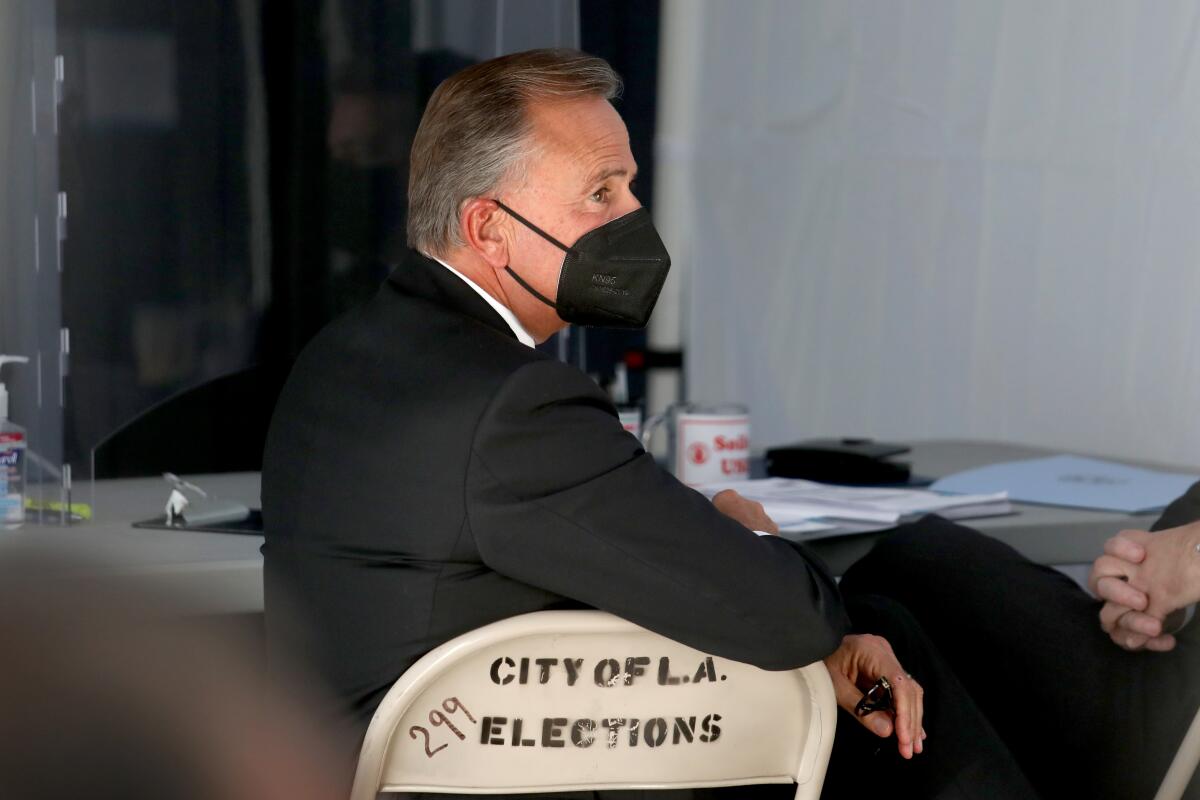
His ability to self-fund a campaign will upend a field that appeared to be complete.
Rep. Karen Bass (D-Los Angeles) emerged as an early front-runner; City Atty. Mike Feuer and City Councilmen Kevin de León and Joe Buscaino are also leading candidates. All four have spent several months fundraising and laying out positions on the dominant issues of crime and homelessness.
Bass, who raised nearly $2 million and has a national profile, is likely to secure a spot in the November election — making the June primary largely a question of who will join her on the ballot.
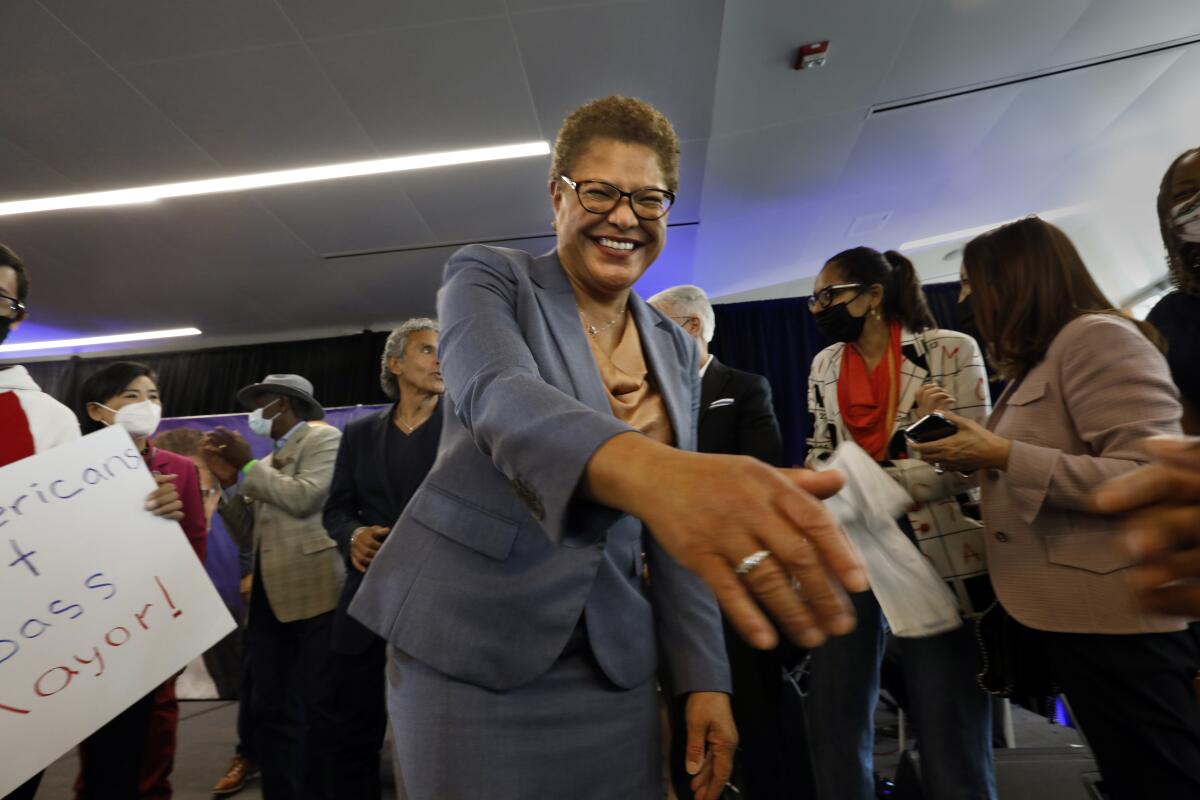
Buscaino, a Democrat, has tacked to the right of other candidates in a largely progressive field. Caruso’s candidacy will make that path more difficult for Buscaino, said Fernando Guerra, director of Loyola Marymount University’s Center for the Study of Los Angeles. Guerra said Caruso’s candidacy might benefit Bass, giving her a clear opponent during the primary whom she can target without alienating other Democrats.
“It will be easier for Karen Bass to use him as a foil, as compared to Feuer, De León or Buscaino,” Guerra said.
Forbes has pegged Caruso’s net worth at $4.3 billion. In addition to the 575,000-square-foot Grove shopping center in the Fairfax district, the Brentwood resident developed Americana at Brand in Glendale and Palisades Village, as well as the posh Montecito oceanfront hotel Rosewood Miramar Beach, among other properties. His candidacy has drawn comparisons to that of Richard Riordan, the Republican businessman who was elected as mayor in 1993.
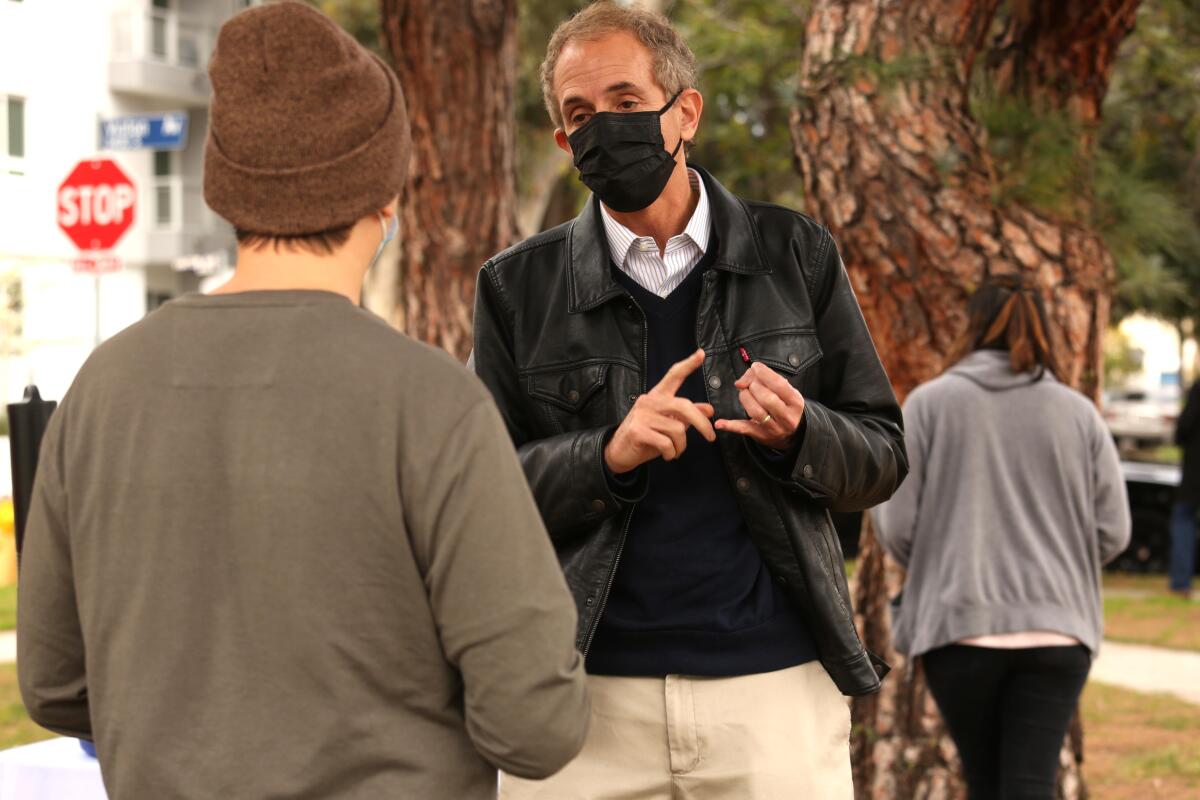
Caruso was a Republican for decades before switching in 2011 to no party preference. Upon changing his registration in January, he described himself as a “pro-centrist, pro-jobs, pro-public safety Democrat.”
Even with the switch in registration, Caruso’s conservative history will likely loom large over the race. The central question remains whether Los Angeles — a city that has grown far more progressive and diverse in recent decades — has the stomach to put a billionaire former Republican in charge.
Guerra said that even a few months ago his answer would have been “absolutely not.” But, he continued, “the narrative with homelessness and crime has really shifted.”
“There’s a lot of voters who would consider voting for Rick Caruso today that would not have considered voting for him just six or nine months ago,” Guerra said.
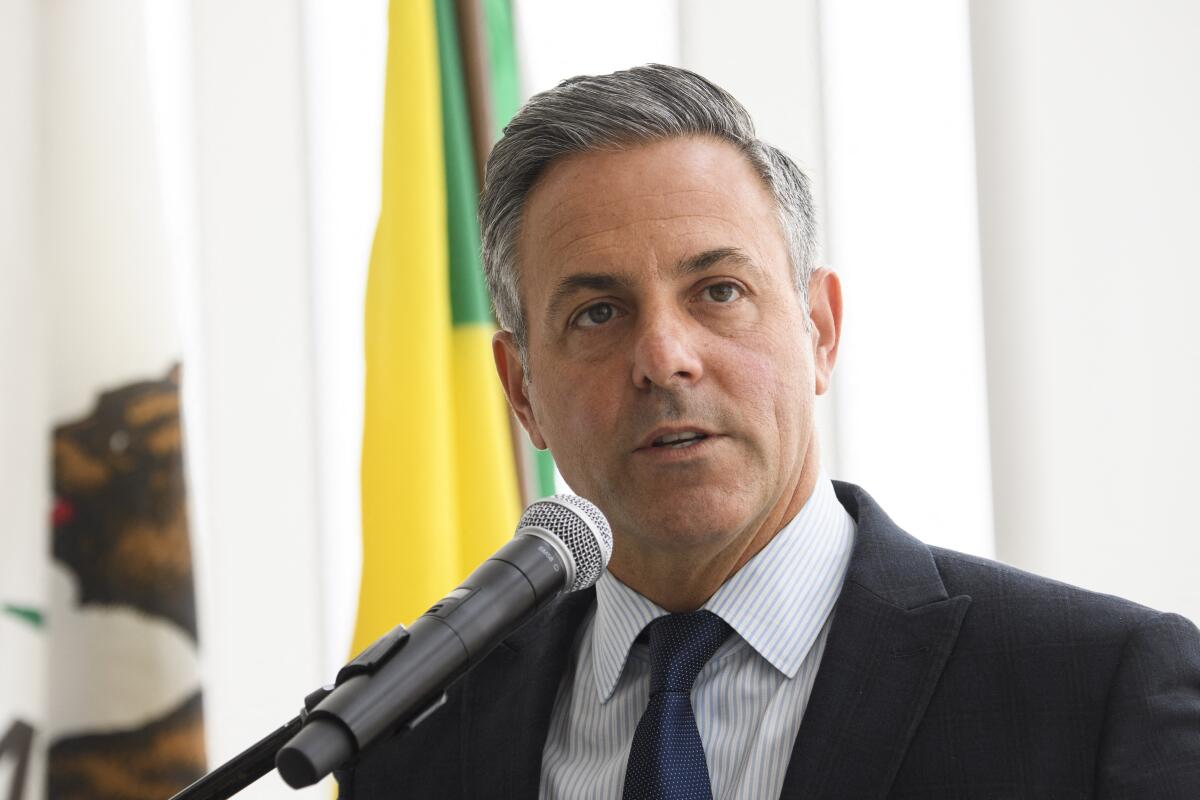
Still, Sonja Diaz, director of the UCLA Latino Policy and Politics Initiative, cautioned that the Los Angeles of today is starkly different from the city that elected Riordan. Among other factors, Diaz cited the success of recent ballot measures related to housing and criminal justice reform that she said showed a preference for data-backed policy interventions aimed at root causes, rather than “penalizing people and going back to a ‘broken windows’ regime.”
In a city that is nearly 50% Latino, the success of any mayoral candidate will depend, at least in part, on the ability to appeal to voters in that community.
“Obviously, COVID-19 has had a disparate impact on Latino households in this city,” Diaz said. “So a mayor is going to have to articulate a policy agenda that centers Latino workers and Latino households in ways that they can remain in the city and not just survive but thrive.”
Friday’s filing follows months of speculation about whether Caruso — who has toyed with the idea of a mayoral run for nearly two decades — would enter the race. The native Angeleno came close to launching a campaign in 2013 but decided that a grueling race wasn’t something he wanted to put his four children through, people involved said. The youngest of the four is now in her 20s.
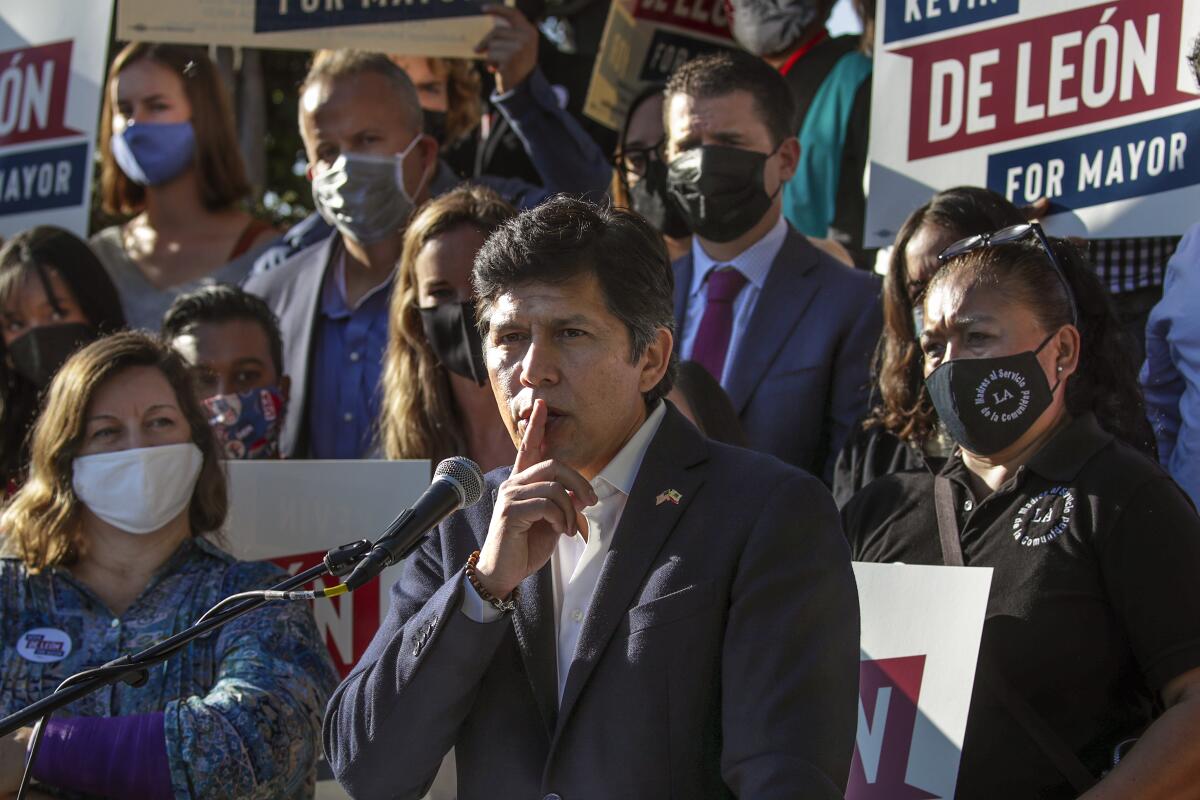
The Times previously reported that Lex Olbrei, who in late January left her role as policy director to Councilwoman Monica Rodriguez, would be Caruso’s top campaign official, along with a cadre of high-powered advisors such as Ace Smith and Mark Fabiani.
Caruso’s significant business interests in the city he hopes to lead will undoubtedly raise questions around conflicts of interest. But government ethics experts say his business holdings do not prevent him from holding office, as long as he properly discloses his financial interests and carefully follows protocol around potential conflicts as they arise.
“If there’s anything specifically involving one of his properties, [such as] an ordinance or a contract, he might have to disqualify himself,” said Bob Stern, co-author of the state’s 1974 Political Reform Act and former general counsel for the California Fair Political Practices Commission. “But if it’s just generally dealing with development, he wouldn’t have to disqualify himself.”
Rick Caruso has considered running for L.A. mayor before but has never jumped in. For this year’s race, he promises a “final decision shortly.”
It’s unclear how Caruso would handle control of his business interests should he take office.
During his campaign for mayor, Riordan said he would place his private holdings in a blind trust to avoid potential conflicts of interest. Issues were occasionally raised during his tenure, and he paid a $3,000 fine for violating the state’s conflict-of-interest law in 1996. The issue — which Riordan’s office called an inadvertent, honest mistake — involved the then-mayor acting on matters regarding the tenant of a downtown building he partially owned.
For Caruso, “there should be enough of a wall between him as a potential mayor and him as a businessperson that people aren’t wondering, ‘Who is he making this decision for, us or himself?’” said Jessica Levinson, an election law professor at Loyola Law School and former Los Angeles City Ethics Commission president.
Other candidates started taking shots at Caruso before he’d even entered the race.
“The last thing our city needs is transparently poll-driven vacillation on what should be core values,” Feuer said Friday morning, criticizing Caruso’s change in voter registration and prior support of anti-abortion politicians Rep. Kevin McCarthy (R-Bakersfield) and Sen. Mitch McConnell (R-Ky.).
Buscaino lambasted Caruso’s support for L.A. Dist. Atty. George Gascón during his campaign, saying Angelenos “should be deeply concerned about Mr. Caruso’s commitment to public safety.”
Caruso co-hosted a fundraiser for Gascón in February 2020 but later donated $45,000 to a committee supporting incumbent Dist. Atty. Jackie Lacey, according to contribution records provided by his campaign.
More to Read
Sign up for Essential California
The most important California stories and recommendations in your inbox every morning.
You may occasionally receive promotional content from the Los Angeles Times.
